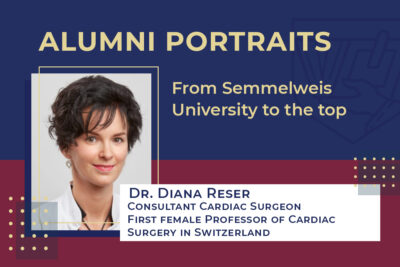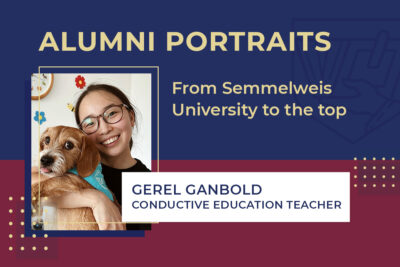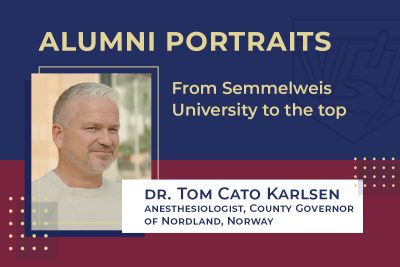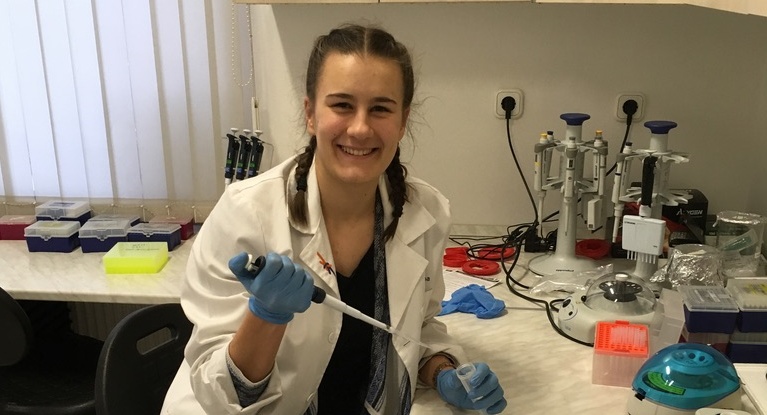
Why have you chosen a career in medicine?
I am one of those few who only decided to become a doctor as a high school senior. I was intrigued by the enthusiasm of my classmates and friends for medical school, and by the time I applied, I was sure that this was the right path for me. In the first months of university, alongside my interest in science, I quickly developed a love for medicine and patient care, which of course is still with me today and drives me to conscientious, precise work, even though I am not directly involved in healthcare at the moment.
Did you have a role model to follow in this career?
I was inspired by the example of my colleagues whom I had the opportunity to observe while caring for patients during my university years. It is fantastic to watch doctors like them at work; I still vividly remember some of the clinical rotations, which left me amazed and made me decide that I would strive for a similarly supportive attitude and clear patient communication throughout my career.
You were already doing research in a laboratory at the young age of 17. What drove you, what was your goal?
I joined the Semmelweis Lendület ‘Momentum’ Program’s Molecular Oncohematology Research Group at Semmelweis University’s Institute of Pathology and Experimental Cancer Research as a high school senior. Under the guidance of Dr. Csaba Bödör, it was in this lab that I learned all the research skills that I still rely on today, as well as the research mentality that emphasizes the importance of teamwork and a healthy competitive spirit. In the first one or two years, I tried to absorb as much knowledge as possible, but later on, I started to set myself specific goals, especially in terms of publications and grants. Through these, and by managing successes and failures, I have made great strides in learning how to consciously build my career.
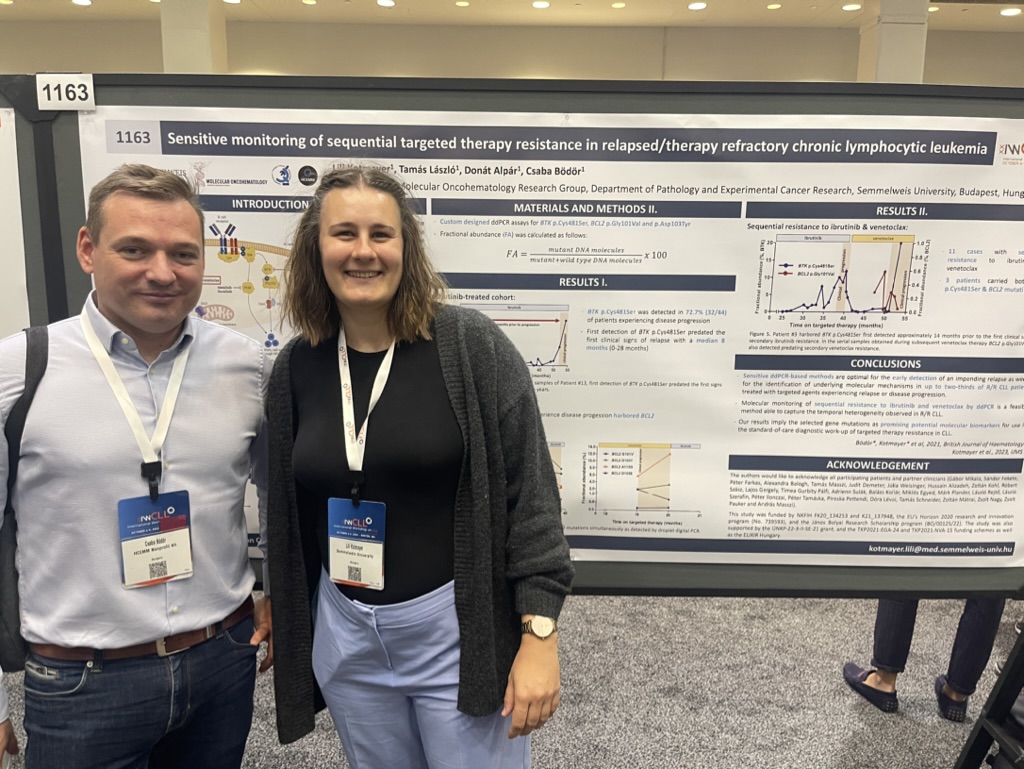
Please tell us about your university years.
For me, the most memorable university experiences were making lifelong friendships and the support I always received from someone, no matter how challenging my studies or research projects were. Many people point out that medical school is not a sprint but a marathon, but I think it is also important to add that we are not alone in this. Just as we can rely on our colleagues to help us later in our medical career, we can ask for help at university if we are facing difficulties.
How did you choose your field of specialization?
Already as a high school senior, I was fascinated by the complexity of the hematopoiesis in our bone marrow and, in the noble sense of the word, the creative strategies for the treatment of leukemias/lymphomas, where surgical therapy is not applicable or only to a very limited extent. Perhaps this is what led to the first appearance of targeted therapies in onco-hematology, which represent a breakthrough in cancer therapy. The first time I heard about the ‘fairy tale’ of imatinib was in my high school years. This first targeted therapy, which was approved in the early 2000s, managed to ‘tame’ the previously incurable chronic myeloid leukemia (CML) into a well-manageable, chronic disease.
In 2021, you received the Medical Student of the Year Award and the Pro Scientia Gold Medal for your work as a Students’ Scientific Association (TDK) researcher. Tell us about the latter.
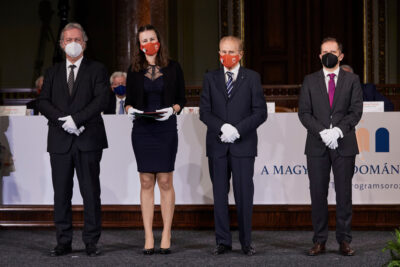
My main research focused on the background of resistance to targeted therapeutic agents in chronic lymphocytic leukemia (CLL). I joined and later took the lead on a project that was already underway in the lab, focusing on the study of mutations in blood during ibrutinib resistance. The project was later extended to include venetoclax resistance and we found that for both agents there are genetic abnormalities that can be detected in blood and bone marrow samples months or even years before clinical signs of resistance develop. These mutations can be used as biomarkers of resistance and can facilitate a timely change in therapy. The test we have developed is now available to all CLL patients in Hungary at Semmelweis University.
Why would you recommend students follow your example and conduct scientific research? What is the significance of a TDK research project?
I think that the scientific work I started as an undergraduate made me more precise and patient, but it also gave me a lot of new acquaintances and friendships that have shaped my career ever since and helped me through the more difficult, less successful periods. Therefore, I highly recommend everyone to try their hand at scientific research. In the beginning, the personality and mentorship of the supervisor might be more important than the chosen topic, as the latter can be easily adapted later.
What is your current research focus?
In addition to my previously mentioned CLL-related research, my early years at university were spent focusing on familial myeloid diseases. This took a back seat for a while during my PhD studies, but as a postdoctoral researcher I returned to this incredibly exciting topic and it now constitutes the backbone of my scientific work. Despite my rediscovered research profile, my focus on CLL has not been completely interrupted, as I am also currently working on a European Hematology Association (EHA) Research Mobility Grant project, examining spatial and temporal variations in ibrutinib and venetoclax resistance mutations at the single-cell level. This EHA-granted research project is a good example of a collaboration between Semmelweis University and St. Jude Children’s Research Hospital: The laboratory background for the so-called ‘single-cell sequencing,’ which is of limited availability in the region, is offered by St. Jude, while the unique patient samples are provided by my former research group at Semmelweis University.
How did your years at Semmelweis University influence your later career?
I owe thanks to Semmelweis University, because I acquired all my medical and research know-how here, and I have received a solid foundation I can build on in the future. The TDK project and later the MD-PhD training introduced me to national and international experts, many of whom are still paying attention to my career and whose help I can always count on. In fact, I met my current supervisor in the framework of such an international research collaboration as a fourth-year medical student.
What is your day like as a postdoctoral researcher at the institution?
I don’t have a fixed work schedule as a researcher, my days are divided between the wet lab part of experiments and data analysis, publications, and submissions. In the lab, a postdoctoral researcher typically works on one large and several smaller projects simultaneously, but there are also frequent internal and external collaborations across research groups, so I coordinate several smaller collaborations. As a physician, I also try to attend clinical meetings, where I often encounter very interesting and rare diseases.
What advice would you give to our undergraduate medical students?
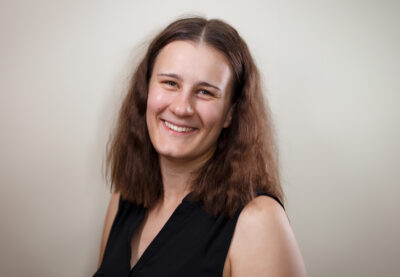 I am not trying to encourage anyone to study even harder; exam results lose a lot of their significance over a few years, so it is important to maintain the perseverance and commitment that are the hallmarks of a medical doctor, even after a disappointing end-term or comprehensive exam result. I find it important to cultivate friendships both inside and outside the university, as these relationships can be surprisingly energizing, even in seemingly impossible situations. I cannot stress enough the importance of maintaining mental health. Spending time with friends, doing TDK, or volunteering at the university are also very important, in my opinion. Medicine is one of the most beautiful helping professions, but it is often difficult to face the challenges alone. I encourage everyone to feel free to ask for help if they get stuck, because becoming a doctor and learning how to do it, as well as patient care, can be much easier if done together as a team.
I am not trying to encourage anyone to study even harder; exam results lose a lot of their significance over a few years, so it is important to maintain the perseverance and commitment that are the hallmarks of a medical doctor, even after a disappointing end-term or comprehensive exam result. I find it important to cultivate friendships both inside and outside the university, as these relationships can be surprisingly energizing, even in seemingly impossible situations. I cannot stress enough the importance of maintaining mental health. Spending time with friends, doing TDK, or volunteering at the university are also very important, in my opinion. Medicine is one of the most beautiful helping professions, but it is often difficult to face the challenges alone. I encourage everyone to feel free to ask for help if they get stuck, because becoming a doctor and learning how to do it, as well as patient care, can be much easier if done together as a team.
Dr. Zsuzsanna Fecser, Alumni Directorate
Translation: Judit Szabados-Dőtsch
Photos by Lili Kotmayer, MD, PhD
